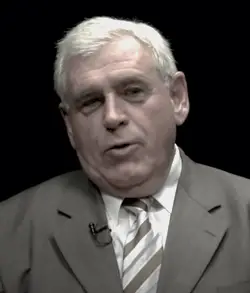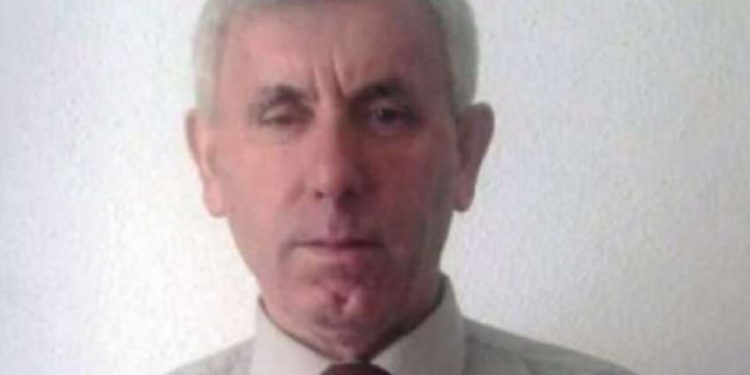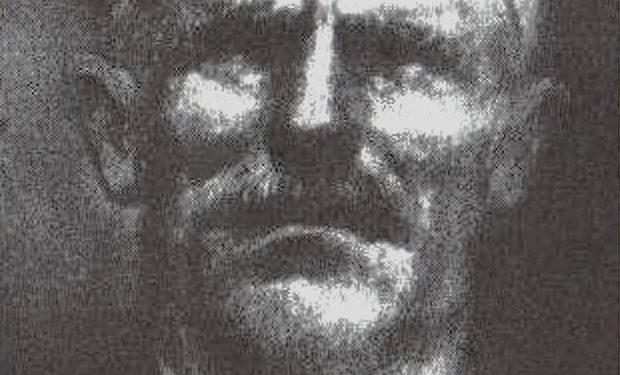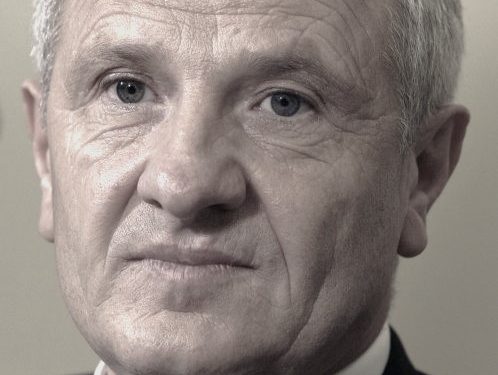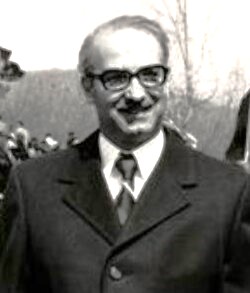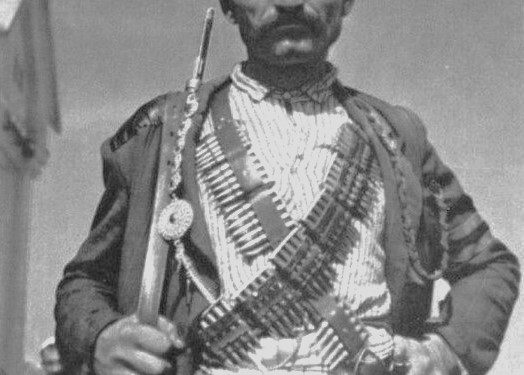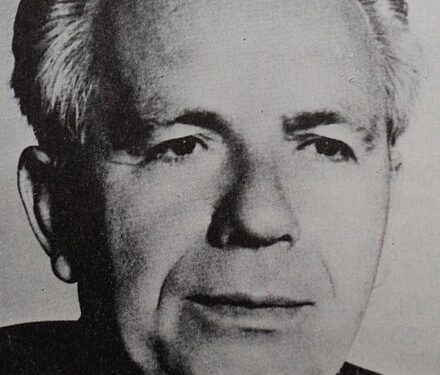By Ragip Guraziu
Part one
The Drenica Uprising and the 1981 Demonstrations
– Did Fadil Hoxha have a hand in the killing of Shaban Polluzha, the Tivar Massacre, and the 1981 demonstrations? –
Memorie.al / Regarding the killing of Shaban Polluzha, who was killed by communists led by Fadil Hoxha. The latter, while alive, had stated that Shaban Polluzha had been liquidated, and after this, Drenica had calmed down. Moreover, the communist Hoxha had said that people from Drenica had also participated in Polluzha’s liquidation.
The truth about the 1981 demonstrations, “the truth about who incited those protests,” must also be clarified, along with the term “counter-revolution” and the ideological-political differentiations.
Because, in 1981, Mahmut Bakalli, as the head of the Communist Party in Kosovo, resigned from all functions as a sign of disagreement with the stance of the leadership in Belgrade that these events were counter-revolutionary. And [he disagreed with] Fadil Hoxha’s position that when Kosovar politicians disregarded Serbia, suggesting the Serbian army be brought into Kosovo because, according to them, Kosovo was its province, they betrayed Fadil Hoxha [who thought] they were intervening in the name of Yugoslavia. This betrayal was cooked up for Fadil Hoxha, he signed it, and students suffered in the dormitories, being dragged out roughly by the Serbo-Slavic army in the name of the Yugoslav army – a testimony from Mahmut Bakalli, Azem Vllasi, etc.
Bakalli was a deputy in the first legislature of the Kosovo Assembly during the years 2001–2004, from the ranks of the AAK, and for a time, an advisor to Ramush Haradinaj; he was buried with KLA honors.
Fadil Hoxha’s Account of Shaban Polluzha’s Death
This was Fadil Hoxha’s account of the killing of Shaban Polluzha:
“Many of our people were killed in the war. This lasted for nearly a month; the calming of the situation in Drenica lasted about a month and a bit more. The fight against that unit, as Shaban Polluzha’s unit was called, a part of which quickly dispersed and fled, but a part of them fought against us, especially Mehmet Gradica and others, as well as Shabani. Shabani was killed; his son was killed. This lasted about a month, but quite a few of our partisans were also killed there. I don’t know the exact number.”
“With the liquidation of this group from Drenica, Drenica was almost calmed. I wanted to tell you that even the people of Drenica, a large part of them, took part with us, afterwards against these [the rebels]. So this is extremely important, otherwise, we would have problems and measures remaining in Drenica,” – says Fadil Hoxha, quoted in Veton Surroi’s book, in his interview given via tape recorder to Rexhai Surroi, in August 1963.
According to Hoxha’s version, Shaban Polluzha had broken the agreement with the communists and had not kept his promise to lead the Drenica Çeta (Company) to the Srem front, where fighting was taking place between the Germans and the communists, as part of the Second World War. According to Hoxha, Shaban Polluzha and his soldiers had agreed to join the communists and participate in the Srem front, in Serbia, where they were fighting against the Germans.
However, as Shaban Polluzha’s company was passing from Drenica to Podujevë, heading for the Srem front, hundreds of residents of Llapi had asked Polluzha and the Albanian soldiers not to go to Serbia and to leave the cities of Kosovo in the hands of Albanian and Serbian communists. And so it happened. Shaban Polluzha’s fighters had returned to Drenica, where they were subsequently killed by Fadil Hoxha’s communists.
Before he died, Fadil Hoxha had become an honorary member of the Democratic Party of Kosovo and was buried with honors by the Kosovo Protection Corps (TMK), which had been the successor to the KLA. Shaban Polluzha was honored by the President of Albania, Sali Berisha, in 1993, with the decoration: “First Class Order for Patriotic Activity,” while President Fatmir Sejdiu, in 2009, declared Polluzha a “Hero of Kosovo.”
A short time ago, the only city in Europe [with this plan], Gjakovë, had started procedures for honoring a communist, such as Fadil Hoxha. The construction of his bust in the middle of Gjakovë was even planned. This project has not yet been realized. There is still no document in Kosovo condemning the crimes of communism. There have been several attempts, but they have also failed in the Parliament of Kosovo, to issue a Resolution that would condemn the crimes that occurred during the communist era.
The Uprising of Shaban Polluzha (1945)
Who was Shaban Polluzha?
Born from numerous military divisions of Serbia, Montenegro, Macedonia, and Kosovo, on February 21, 1945, after a fierce battle in the towers of Hasan Syla in Trestenik, the legendary Shaban Polluzha fell heroically, one of the giants of our national history, along with a part of his fighters and the well-known brave man, Mehmet Gradica.
All these Yugoslav divisions, despite the mortar fire and heavy artillery, only managed to demolish the fortification after 9 hours, where 150 Albanian guerrilla rebels were located. Here, one drama ends and another bloody drama against Kosovo continue: massive executions, imprisonments, disappearances, Tivar, Srem, Trogir…! The year 1945 is considered the most tragic year, along with the wildest winter remembered.
Shaban Polluzha, a man of average height, gray-haired with a gloomy nature, had opposed injustices against the Albanians of Kosovo at various times: during the First World War, during the Serbo-Croatian-Slovene Kingdom, and in 1945 he organized the uprising against the Serbo-Yugoslav occupation. He brought approximately 10,000 fighters onto the battlefield.
He was born in Polluzhë, Drenica, in 1871. He took his surname from his native village, while belonging to the Kastrati tribe. He was raised and educated in a family with a national tradition, also known for resolving inter-family and interpersonal conflicts. He was also the chairman of the Conciliation Council in Drenica and the mayor of Polac municipality. A rare, highly respected personality with exceptional human qualities. On one occasion, when one of his three sons was imprisoned, his wife said: “They want to shoot your son, while you are acting as if nothing happened,” he replied: “Even the others there have someone of their own, just like our son.”
He was extremely cautious, but at times he knew how to rebel. When one of his soldiers threw bread out the window because it was slightly underbaked, he raised his voice and said: “Do you know we are at war, not at home?” Meanwhile, when his eldest son was wounded, although it deeply touched his soul, he told his comrades in arms: “Others have also been wounded and killed.”
In the harsh winter of that year, when he saw the people suffering for bread and being massacred by the Chetniks and communist partisans, he shed tears. His father, Rexhepi, was executed in 1912 in Serbia, having been forcibly taken with many other men from Kosovo. He experienced his killing, and that of other men, severely, and this event motivated him more to dedicate himself to the struggle in defense of the national and human rights of his people.
He had experienced four occupations, one after the other: Turkish, Serbian, Bulgarian, Austrian, and Yugoslav. He had helped Azem Bejta, as a friend he had, and his Kaçak (rebel) movement when he was mayor of Polac. In 1941, the gendarmerie led by the Italians interned his family in the Sheremet Towers in Pejë, while in Polluzhë they burned his three-story house, along with the house and other objects. His tower was leveled to the ground again in 1945 by the KNOJ Brigade.
Much valuable property was destroyed by the flames. In 1941, he organized his volunteer forces against the penetration of Chetniks into the region of Koshare of Ibër, while in 1943; he led a large group of 3,000 volunteers in defense of Novi Pazar, where Chetniks carried out terrifying massacres against Bosniaks and Albanians, such as in Bihor and other places in this region.
In January and February 1945, he resisted Serbia’s extermination project in Kosovo with force. He brought approximately 10,000 fighters onto the battlefield, mainly from Drenica, to stop the Chetnik crimes against women, children, and the elderly, which were being carried out all over Kosovo. The socio-political circumstances during this period were very unfavorable for Kosovo.
In Belgrade and Podgoricë, a dark scenario was planned for Albanians outside state Albania, in Kosovo, Macedonia, and Montenegro. This scenario provided for the mobilization of Albanians of various ages and their dispatch to the Srem front, Trogir, and other battle lines in Yugoslavia, while Chetniks of Draža Mihailović and other Serbian gangs were to be brought into Kosovo and other Albanian territories to commit massive crimes against Albanian civilians.
Based on this infamous scenario, Shaban Polluzha was insisted upon to convince him to depart with his brigade to fight against the German Nazis in the Srem region of Vojvodina, while the Chetniks and partisans would commit every evil in Kosovo, unimpeded by anyone. Trapped and facing great responsibility towards the people, Shaban Polluzha, who was 75 years old, initially accepted, and while still in Podujevë on the way to Srem, terrifying news reached him that the Chetniks had entered northern Drenica and some parts of Kosovo bordering Serbia and were executing people in Albanian families, even slaughtering them with bayonets.
Following this information, and despite the strict order of the Yugoslav National Liberation War Staff to continue the route to Srem, saying that no more killings of innocent people would happen, he categorically refused their assertion and told them in conversation that; “you betrayed my trust.” He had constantly doubted this “trust”! This doubt stemmed from his long experience. While he was turning back, Shaban Haxhia with the VIIth Brigade of “Kosovo and Metohija,” on the same day, was traveling to the Srem front.
During the return from Llapi to Drenica, his brigade was ambushed by partisan units, but without consequences, and crossed Çiçavicë, concentrating in Drenica, because a few days earlier, the local leaders and the most authoritative people had been liquidated, and the fighters were from this part of Kosovo. Serbia considered this region dangerous, remembering the many years of resistance by Azem Bejta. On February 8, 1945, the Supreme Staff of the Yugoslav National Liberation Army put Kosovo under iron military administration and declared a state of war. Now Albanians were executed in their homes, in the streets, and wherever they were located and moved.
Shaban Polluzha and his fighters settled in Western Drenica and were organized there into military formations: companies, battalions, companies, platoons, and smaller units. In the beginning, due to poor relations between him and Mehmet Gradica, they waged the war against the Serbo-Partisan brigades separately, but the national ideal united them in one front. Actions were organized according to the terrain and strategy in various places, concentrated in Rezallë, Likovc, Obri, Plluzhinë, Ticë, Açarevë, Tërstenik, Llaushë, Prekaz, and later in other villages of Eastern Drenica, at the foot of Çiçavica.
The Drenica Brigade also had fighters from the Vushtrri, Mitrovica, Artakoll, Llapushë regions, and fewer from other areas. Serbian, Montenegrin, Macedonian divisions and military brigades, and those where Albanians from Kosovo were also included, as well as the 5th Brigade of Albania that returned to Kosovo after Višegrad, committed horrific crimes against the civilian population, unable to directly retaliate for their losses from Polluzha’s Albanian insurgents.
The commander of the military administration, Sava Derljević, wrote about the Drenica uprising some time later: “…at least 4 divisions were engaged on our side, the 46th Serbian brigade, the 52nd Kosmet [Kosovo and Metohija] brigade, the operative group of brigades (the 1st Bokel brigade, the 6th Montenegrin brigade, two Kosmet brigades) and the KNOJ Brigade. The 24th Serbian division and the 41st and 50th Macedonian divisions were also engaged from time to time. All these forces had over 40,000 soldiers. In these clashes, we also suffered serious losses,” says Derljević. The massacres in Tërstenik, Skenderaj, Polac, Rezallë, Drenas… Druar, and in other villages of Drenica and Kosovo are horrific.
In this war, the Serbian, Montenegrin, Macedonian brigades, and the Kosmet one, suffered considerable losses in personnel, especially in the last part of January and the beginning of February 1945. It is considered that 1,500 enemy fighters were killed in the fierce battles against Shaban Polluzha’s Brigade, and another number disappeared. The biggest battles took place in Tërstenik, Obri, Rezallë, Likovc, Tërrnafc, Makermal, Çiçavicë, and near the Pestovë Bridge. A poor people like Drenica found it difficult to feed as many fighters as Shaban Polluzha had, so he was forced to move with his brigade, crossing to the villages at the foot of Çiçavicë, and then to Shalë of Bajgora and back to Drenica.
Shaban Polluzha and his war headquarters, located at the Malaj family in Rezallë, were also aided by several nationalist intellectuals, such as Selman Riza, Ymer Berisha, Marije Shllaku, Ibrahim Lutfiu, and clerics Mulla Ilaz Broja, Mulla Brahim Polaci-Hoti, etc., while Asim Luzha and Qamil Hoxha were massacred, the former in Tërstenik, the latter in Skenderaj by the KNOJ brigade.
Furious with the syndrome of hatred towards Albanians, they burned and destroyed everything in front of them. In this winter, the fiercest on record, women and children took their belongings in their hands, not knowing where to go. After the bloody suppression of the Drenica War, violence and terror intensified in Kosovo. In the spring of that year (1945), the Tivar Massacre occurred; intellectuals, nationalists, idealists, and civilians were executed with and without trial. / Memorie.al




